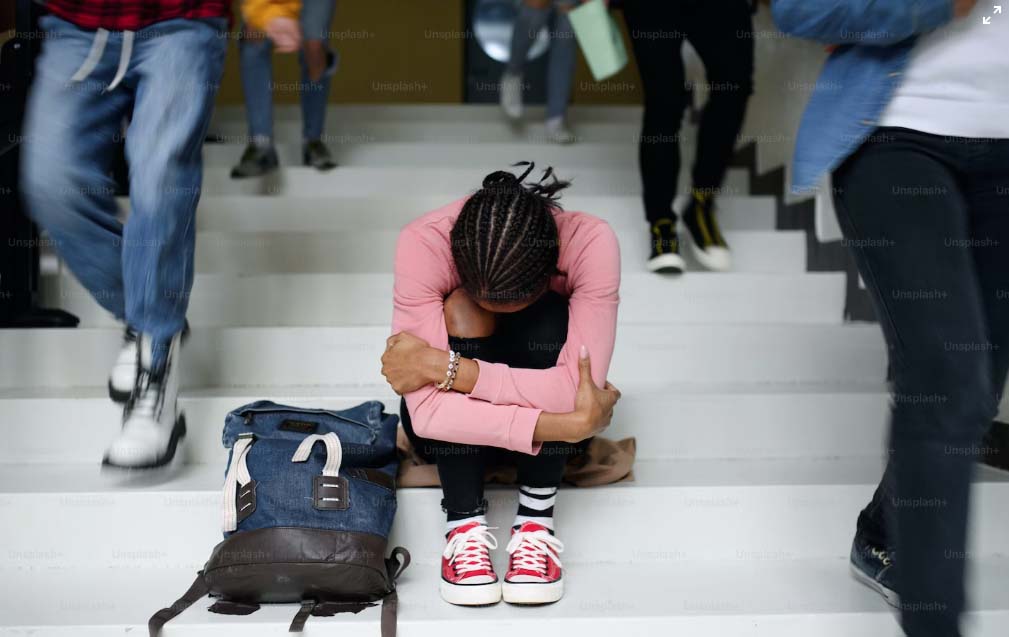In a 2021 study by the Utah Department of Health, more than 24 percent of students in grades 8, 10 and 12 reported feeling “moderately socially isolated from their peers.” In a Dec. 31 interview on ‘Meet the Press,’ Gov. Spencer Cox attributed much of that problem to the effects of overuse of social media by young people (Image courtesy of Unsplash).
SALT LAKE CITY – Benjamin Franklin famously advised that “… an ounce of prevention is worth a pound of cure.”
Gov. Spencer Cox probably had that old adage in mind when he launched Utah’s ongoing war on social media giants over the alleged harm their overuse causes Utah’s young people.
He definitely had that saying in mind during a Dec. 31 interview on Sunday morning’s “Meet the Press.”
“I think it’s obvious to anyone who spends any time on social media or has kids,” Cox replied when asked to defend his motivation in the battle against social media.
“I have four kids,” Cox explained. “I’ve seen what’s happened to them as they’ve spent time on social media – and to their friends. This is absolutely causing these terrible increases … in anxiety, depression and self-harm amongst our youth.”
Preventing that harm is all well and good, of course. That’s what Cox and Attorney General Sean Reyes intended in 2023 when they sued Tik Tok and Meta (the parent company of Facebook and Instagram) in Utah courts.
But what happens when the damage is already done and Utah must deliver that “pound of cure” for youth statewide?
A 2017 study found that more than 1 in 5 adult Utahns had mental health issues, the highest prevalence in the nation. Moreover, a 2021 study by NiceRx suggests that an increasing number of adults have developed anxiety over the past few years due to the effects of the COVID-19 pandemic.
Recent studies have also shown that mental health issues are even more prevalent among adolescents, teens and young adults.
More than 35 percent of junior-high and high school students in Utah reported feeling sad or hopeless during a 2021 study conducted by the Utah Department of Health. Additionally, 27 percent of those students reported suffering from psychological distress.
Here in the Bear River Mental Health District, nearly 30 percent of students reported feeling sad or hopeless; about 22 percent reported feeling psychological distress; and, nearly 20 percent report feeling socially isolated.
The percentages of nearly all mental illness indicators were reported to be higher among young women than their male counterparts.
For a change, the experts actually agree with Cox about the dangers of social media.
A recent advisory issued by the office of the U.S. Surgeon General warned that the federal government “… cannot conclude (that) it is sufficiently safe for children and adolescents” to indulge in social media.
That advisory found that children and adolescents who spend more than three hours per day on social media face double the risk of developing mental health problems, including symptoms of depression, anxiety and suicidal ideation.
The 2021 study by the Utah health department found that 18.6 percent of Utah students reported inflicting self-harm, 19 percent of students seriously considered suicide, 14.4 percent of students developed suicide plans and 7 percent of students made one or more attempts at suicide.
To cope with that rising tide of mental illness, Utah has more than 28 residential treatment centers for teens and adolescents scattered across the state.
Utah also has more than a thousand counselors, therapists and other mental health practitioners, many of whom offer their services either online or by telephone.
Therapists, psychologists and counselors are all licensed mental health professionals. Although the terms “therapist” and “counselor” are used somewhat interchangeably, generally therapists offer long-term mental health care, while counselors offer shorter-term care that may focus on one domain, such as depression, anxiety or suicide prevention.
Mental health experts say therapy conducted online or via telephone can be just as effective as in-person therapy, as long as there is a strong connection between the client and the therapist.
Despite the availability of those resources, the NiceRx study found that Utah ranked 39th out of the 50 states and Washington D.C. in the amount of per capita spending on mental health treatments.
Utah spends only $70 per capita on mental health treatment, compared to $345 spent by Maine, $341 by Alaska and $306 by the District of Columbia, the top three states in the NiceRx ranking.
NiceRx is a nationwide service that provides safe and affordable access to offer 1,500 FDA-approved brand-name prescription drugs through its patient assistance programs.

